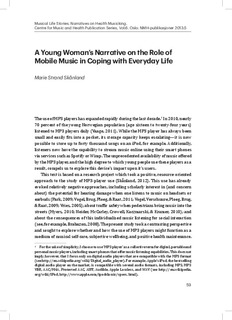A young woman's narrative on the role of mobile music in coping with everyday life
Chapter, Peer reviewed
Permanent lenke
http://hdl.handle.net/11250/196671Utgivelsesdato
2013Metadata
Vis full innførselSamlinger
- Artikler og bokkapitler [390]
Originalversjon
I: Musical life stories : narratives on health musicking, s. 59-74Sammendrag
The use of MP3 players has expanded rapidly during the last decade.1 In 2010, nearly 70 percent of the young Norwegian population listened to MP3 players daily. While the MP3 player has always been small and easily fits into a pocket, its storage capacity keeps escalating—it is now possible to store up to forty thousand songs on an iPod, for example. Additionally, listeners now have the capability to stream music online using their smart phones via services such as Spotify or Wimp. The unprecedented availability of music offered by the MP3 player, and the high degree to which young people use these players as a result, compels us to explore this device’s impact upon it’s users. This text is based on a research project which took a positive, resource-oriented approach to the study of MP3-player use (Skånland, 2012). This use has already evoked relatively negative approaches, including scholarly interest in (and concern about) the potential for hearing damage when one listens to music on headsets or earbuds; about traffic safety when pedestrians bring music into the streets; and about the consequences of this individualised music listening for social interaction. The present study took a contrasting perspective and sought to explore whether and how the use of MP3 players might function as a medium of musical self-care, subjective wellbeing, and positive health maintenance. In the interests of examining the possible role of MP3 players in individuals’ selfcare, the study focused on self-regulation and coping mechanisms. I carried out the research via a qualitative, empirical study using interviews with twelve adult urban users of MP3 players that covered, in particular, their experiences with this device. In this article, I will focus on the story of the youngest informant, an eighteen-year-old young woman, and her use of her MP3 player as a coping and self-regulating resource, in order to explore the general healthful potential of everyday music listening. I will present the young woman’s narrative in parts while introducing theories on self-regulation, coping, wellbeing, and positive health to shed light on her experiences.
Utgiver
Norges musikkhøgskoleSerie
Centre for Music and Health Publication Series;Vol:6NMH-publikasjoner;2013:5
